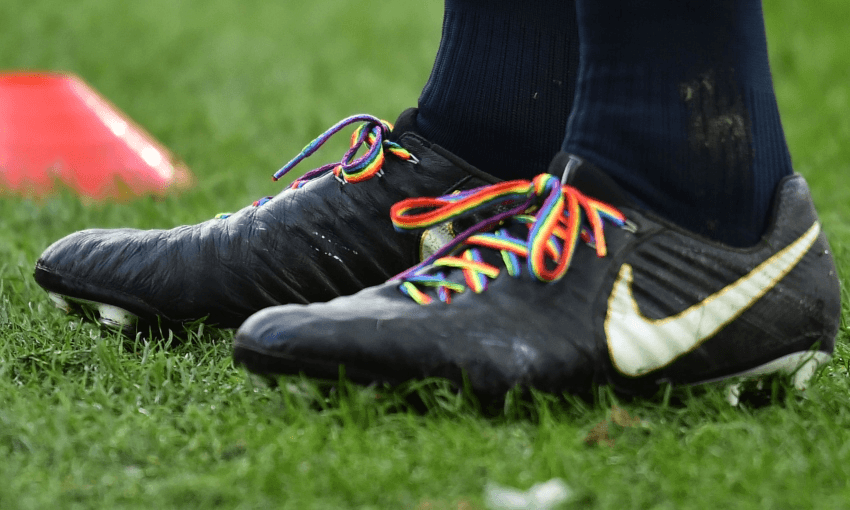Media bias, collective guilt for Nazi atrocities and being on the wrong side of history: It was a pretty heavy Sunday night on Radio Sport.
“Look, a lot of us want to say that we would’ve been definitely anti-Nazi during Nazi Germany, but statistics will tell you that 90% of us would’ve gone along with it. Because you just go along with it for all sorts of reasons. For most people to say, oh I totally would’ve been in the minority that was completely against it and fought against it, statistically, nah.”
That’s a sample quote in a remarkable seven minutes of radio from the most unlikely of places. It was a conversation that ranged over deep questions about political change, society and media, conducted by two blokes who sounded like they had stumbled into each other in the smoking area at the pub.
Radio Sport has long been seen – sometimes unfairly, sometimes not – as a bastion of the pale, male and stale stereotype of sporting culture in New Zealand, and the conversation started off on a vaguely sporting topic. Hosts Andrew Clay and Beaven Dewar were filling the Sunday evening hours between commentaries and highlights on Radio Sport by taking calls on the way things used to be, but after eight o’clock not a lot of calls were coming in. So they riffed, and one of the things that was better, according to Clay, were the protests – especially the Springbok Tour ones.
“And they were fair protests too,” a shouting Dewar interjected, before both hosts agreed that a “mad keen, like, mental keen on rugby” guy like him would have “probably been on the wrong side of history.”
“As a country we bask in the fact that eventually we did the right thing,” elaborated Clay, on stopping sporting contact with apartheid South Africa. “But I tell you what, people like John Minto were hated in this country. There was no grey area, it was this country like you’ve never seen it before.”
“I guess when you look at it now, if there’s any social injustice movement now, that you might go, look at these weirdo hippies, blah blah blah all the rest of it, have a look. Those people you might think are a bit fringy, because they’ve got dreadlocks or whatever, are they going to be on the right side of history as well?”
At this point Dewar admitted that they had strayed a long way from sports chat, but they were too far gone and there wasn’t a lot more time to fill, so why not talk about whether the media had become too left leaning? It had, said Dewar, arguing both out of an amorphous feeling that the TV news was unbalanced, and the rather more quantifiable idea that the vast majority of young journalists coming into the industry didn’t share the views of the likes of Mike Hosking and Leighton Smith, who broadcast on Radio Sport’s sister station Newstalk ZB. That kept the hosts more than occupied until the ads.
Remember, Radio Sport is a station that two years ago had what long-time listener Hayden Donnell described as “the worst 10 minutes of radio” – the so-called Controversy Corner which managed to crack the big three of sexism, racism and homophobia all in one dramatic burst.
So is this all a sign that the editorial direction of Radio Sport is changing? Probably not. One thing that isn’t widely or well understood about talk radio stations is that there isn’t really a party line that broadcasters are meant to follow – there are just people with opinions who get put in front of microphones. Their opinions are their own, rather than being the result of managerial directives.
But it is potentially a reflection of the sweeping cultural changes taking place in the sporting world. Sporting organisations now run campaigns to stamp out scourges like sideline racism, and athletes are increasingly using their platforms to advocate for progressive politics. American footballers and basketballers are protesting police racism, the All Blacks have thrown their weight behind pro-diversity and LGBT efforts, and women’s sport has never been more prominent. Incidentally, Radio Sport’s news team have long taken women’s sport seriously, even if the presenting lineup has pretty much always been a boy’s club.
After wrestling with some of the thorniest issues currently facing the world, normal service resumed, and the hosts threw to highlights, followed by a long-form interview with Barbara Kendall from the archives. But for a few brief, thrilling minutes, listeners were treated to the anarchic freedom of discussion that only live radio can really unleash. When there is nothing but a blank board of calls and time to fill, good broadcasters are able to draw deep from the well of the human experience to bring out something, anything, interesting to talk about, and it can get pretty real. Like dancers with nobody watching, Dewar and Clay broadcast like nobody was listening. Who said sport and politics shouldn’t mix?
The Bulletin is The Spinoff’s acclaimed, free daily curated digest of all the most important stories from around New Zealand delivered directly to your inbox each morning.

